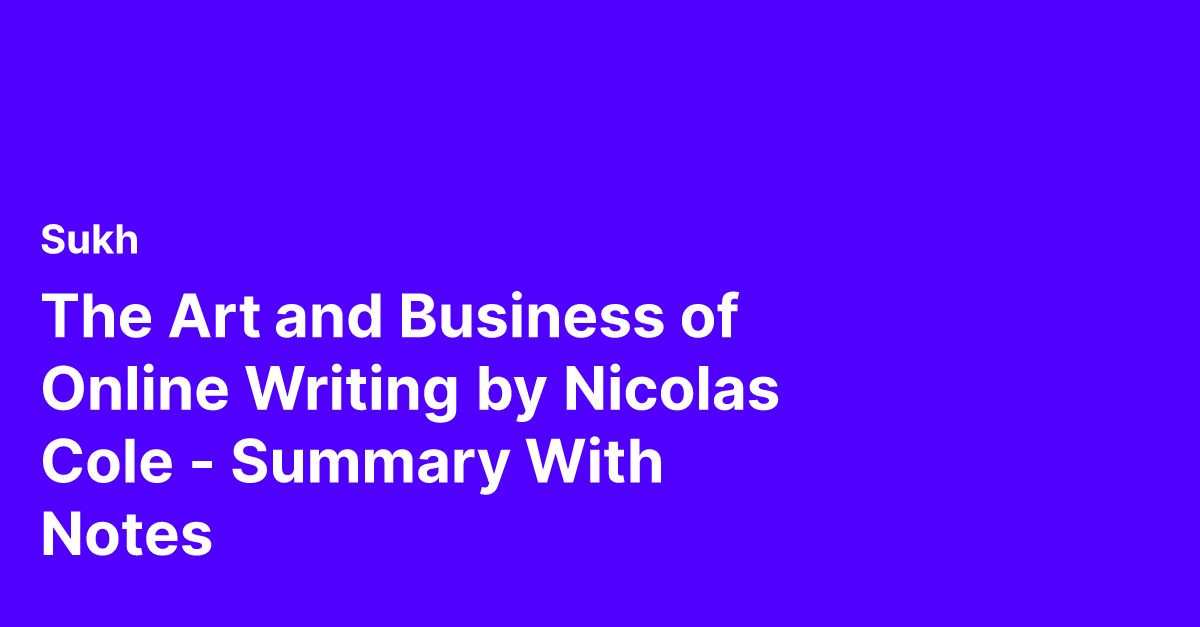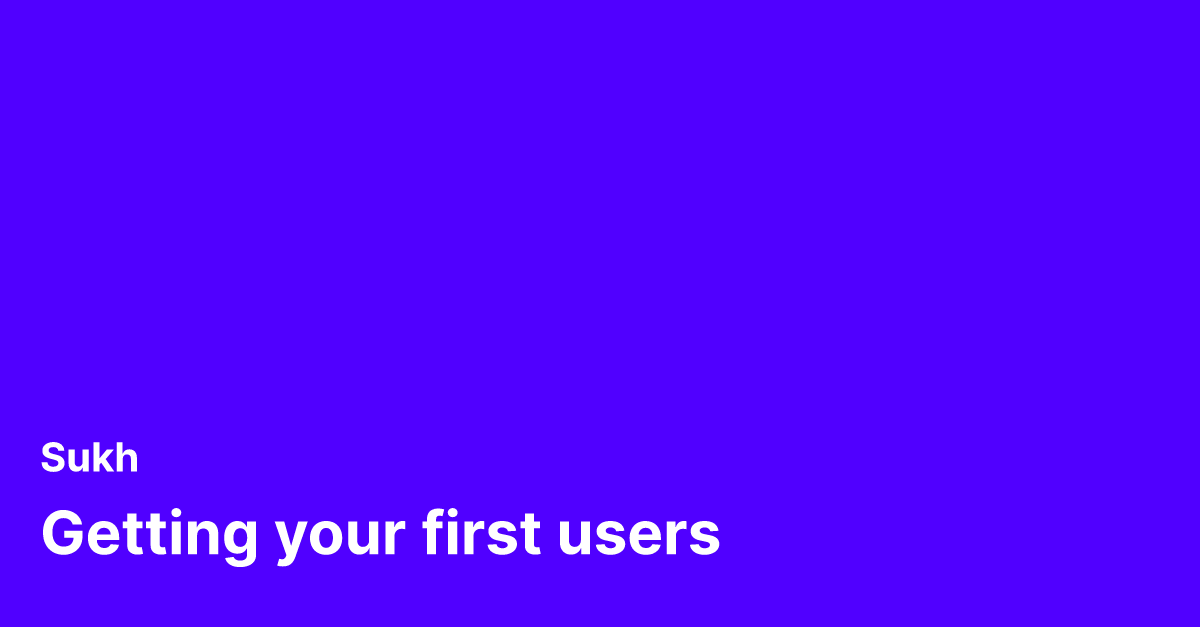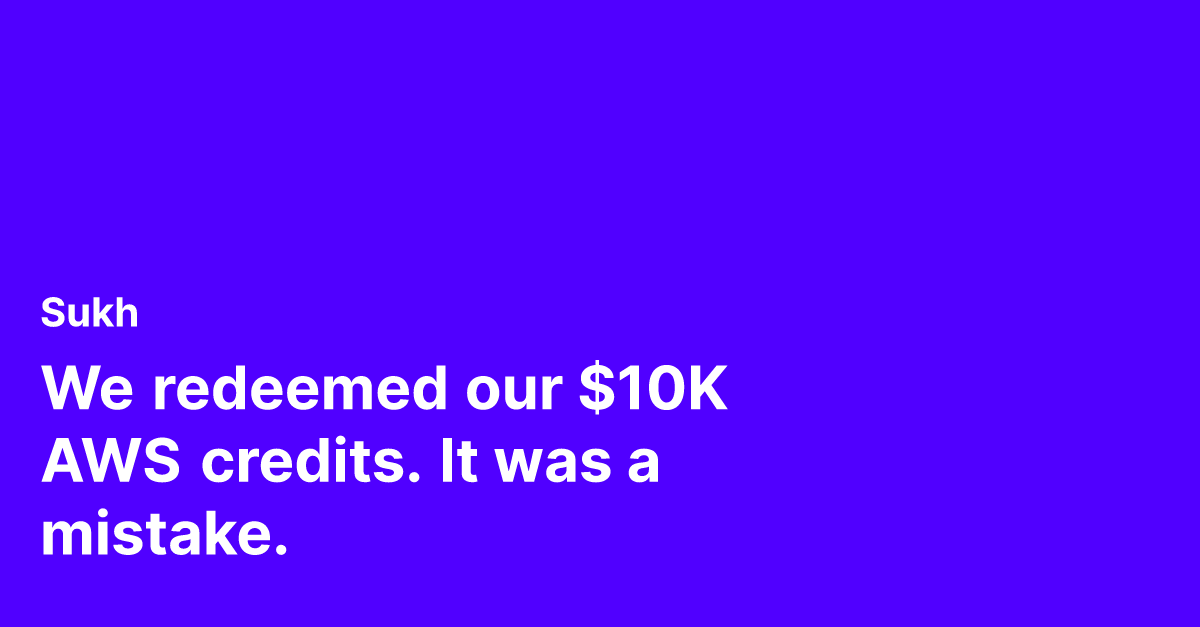Build a writing habit
- Write anywhere and everywhere. Don't only post on your "blog". Every time you write on a forum, subreddit, you are exercising the writing part of your brain. The more you write, the better your writing becomes.
"Practicing In Public is what separates aspiring writers from professional writers." - Nicholas Cole
- You need to optimize for writing fast. "Good" is subjective. Internet likes fast.
- Take over a category. A very specific category. Not just thriller, but vampire thriller for example.
- Increase your Rate of Revelation - the speed at which you reveal new information to the reader. Don't dwell on one point for long without revealing brand new information to the reader. This keeps their interest going.
- Example - “The one thing everyone should know about habits is they are difficult to build—for four reasons. First, <sentence>. Second, <sentence>. Third, <sentence>. And fourth, <sentence>.”
- Own your category - You can't be better at writing a magic book for kids than JK Rowling.
- Good writing should be light. No big, scary paragraphs.
How to write a great headline
- Write a great headline - What this piece is about, who it is for, the promise - what will they get
- Example 1: "The Big Idea That Needs To Get Through Politicians’ Heads To Fix Racial Inequality In America"
- Example 2: "3 Big Ideas From Steve Jobs, Elon Musk, And Jeff Bezos That Changed The World Forever"
- Example 3: "This 1 Big Idea Will Change The Way You Think About College"
- Example 4: “The 1 Mistake All New Project Managers Make—That Ends Up Costing Their Company $500,000”
- Example 5: “7 Small But Meaningful Things You Can Say To Your Significant Other To Show How Much You Love Them”
- Example 6: "How To Write Headlines That Go Viral, Accumulate Millions Of Page Views, And Convert Readers Into Loyal Customers"
- Example 7: “Atomic Habits: An Easy & Proven Way To Build Good Habits & Break Bad Ones”
- Example 8: “Play Bigger: How Pirates, Dreamers, And Innovators Create And Dominate Markets”
- Example 9: “How To Be A Better Writer Today, So You Can Start Writing Best-Selling Books Tomorrow”
- Example 10: "7 Tips For Becoming Smarter, Achieving Chess-Master Memory, And Becoming The Most Interesting Person In The Room"
Proven headline formats
- The 1: "The 1 reason/why/solution/problem for new job seekers to not get fired on your first day"
- Big Numbers: "3K people just filed for unemployment in this small town in Arkansas. Here's why."
- Dollar Signs: “$400 Million Is How Much You Need To Make In Order To Afford This Insane Mansion In Malibu”
- Credible Names: “Will Smith’s Advice On How To Live A Fulfilling Life Will Change The Way You See The World Forever”
- This just happened: “Michael Jordan Just Gave A Press Conference And NBA Executives Are Furious.”
- The Success Story: “How This Small Team Managed To Secure A Six-Figure Investment In Less Than 1 Week”
- Things That Shouldn’t Go Together: “What Jay-Z, Pablo Escobar, And Oprah Can Teach Us About Leadership.”
- For the industry: “3 Things All Successful Small Business Owners Do To Stay Profitable.”
- The topic within the topic: “7 Ways The Real Estate Industry Is Changing (And How You Should Be Investing Your Money).”
- Question/Answer: “Don’t Know How To Track Your Goals? This New App Has The Answer.”
- X Number: “13 Things/Ways/Lessons/Habits Mentally Strong People Don’t Do”. "8 Daily Habits That Will Make You More Productive, Achieve Success, And Gain True Financial Freedom"
- Use Power Phrases: “11 Painful Mistakes Most Founders Make Right After Raising Their First Round Of Fundraising”. " 12 Crucial Lessons About Business You’ll Learn Working For A High-Growth Startup Founder”
How to write introductions
- You want to answer: What is this about? Is this for me? How confident am I that you are going to deliver on your promise (credibility)?
- 1/3/1: Opener, description sentences, and then a concluding remark
- Example:
- Life is all about perspective.
- The exact same situation can be perceived in very different ways by two different people. One might see loss — the other, opportunity. One might feel like a victim — the other, a change-maker. Which means, as far as “absolute” truths are concerned, the first step to becoming who you truly want to be in life means accepting the fact that how you see the world might not be the whole picture.
- So, if our life experience is based upon the way we see the world, then here are some small but incredibly impactful mental shifts that can help you see things from a new perspective.”
How to write conclusions
- Jump off a cliff: Leave them hanging, wanting for more
- Rephrase the main point and end with that
- End with a bulleted summary
- Write confidently and declaratively: "Strongly agree/disagree" is better than meh.
How to promote yourself
- Wrong way is when you make the comment about you
- Example: "I built this, go check it out."
- Right is when you put the reader first and use your work to show credibility
- Example: “… mistake people make is they start with too many different vegetables. I tell this story at length in my new book, “Green At Home: How To Grow Your Own Vegetable Farm In Your Kitchen (For Less Than $50 Per Month),” but the first time I tried growing veggies in my kitchen, I ended up spending hundreds of dollars…”
- In the above example, the first line is giving the reader a well thought-out answer followed by strong credibility in the second line.
- Another example - "The best content marketers are obsessive about using data to measure success. One of the things we do internally here at Digital Press is hold weekly workshops where our team of content marketers will pull up that month’s search volume for each client, and then brainstorm growth hacks we can all use to drive exposure…"
- You can also humble brag.
- Example: “That’s a great point. So I actually own a design firm over on Sunset Boulevard—for context, we design clothes for Kanye West, Beyoncé, Travis Scott, basically the who’s who in the entertainment industry—and one of the big things we’ve learned about design trends is…”.”
- Do this by:
- Always bring things back to the reader’s wants, needs, and desires. Don't talk about you more than you talk about them.
- Only bring up a relevant topic
- Draw attention to a larger point with your experience as context
- Example - “I tell the story in full in my memoir, Confessions of a Teenage Gamer, but one of the first lessons I learned was…"
- Be super casual. Don't be polished and salesy. Weave in your experience as a passing thought.
- Example - "I originally told this story in my book…"
- Example - "Positive workplace culture is extremely difficult to cultivate, but by practicing these three daily rituals as a team, you’ll find it can be nurtured quickly and effectively. For example, every morning at Digital Press, the first thing we do as a team is…"
- Bad example - “I have been helping people build their personal brands online for more than five years now, and more than 10,000 people have taken my free personal branding email course (link),”
- Good example - "I have been helping people build their personal brands online for more than five years now…"
- CTA:
- As signature at the end
- Example: "Want to learn how I built my Personal Brand online, attracting over 50 million readers? Take this course."
- Hyperlink your credible statement in the middle of the paragraph
Content Buckets
- General Audience: Universal topics - positive habits, life lessons, productivity tips. Use your experience in a niche to come up with advice for a general audience. "Life lessons I learned as the VP of marketing at a software company".
- Niche Audience: Pick topics relevant for a more niche audience than #1. Instead of Marketers, it could be Content Marketers.
- Industry Audience: Topics that affect your specific industry
- Formula to create content pieces:
- Step 1: Pick a type of writing
- Actionable Guide
- Opinion
- Curated List
- Story
- Credible Talking Head
- Step 2: Pick the idea that will be communicated
- Explanation (When/Where/How?What something happens)
- Habits (To achieve a goal, or destination)
- Mistakes Made
- Lessons Learned
- Tips
- Stories - Pursuit of a goal
- Step 3: Why me?
- Credibility 1: "I am an expert on this topic. Here's what I think."
- Credibility 2: "I talked to trusted experts. Here's their opinions in one place."
- Credibility 3: "I'm sharing my opinion, but my opinion is the most articulate one of them all"
- Combine the 3 to come up with content.
- Example: “Curated List x Mistakes x 7 Industry Experts (Credibility #2) = the outline of an article titled, "7 Founders Share The Biggest Mistakes They Made Raising Money For Their First Startups"
- Example: “Credibility x Explanation (Why) x Expert (Credibility #1) = the outline of an article titled, "I Was A Professional World Of Warcraft Gamer As A Teenager. Here’s Why eSports Is Going To Become A Multi-Billion- Dollar Industry"
- Example: “Opinion x Lessons x My Perspective (Credibility #3) = the outline of an article titled, "Our Country’s Economy Is Falling Apart. Here’s What That Looks Like For Someone Living In A Low-Income Neighborhood”)"
Create a Content Roadmap
- Take your content buckets and use the content formulas above to come up with your content roadmap
- Example:
- General Audience (Productivity)
- Productivity Tips
- How to be more productive
- How X Startup Entrepreneurs, Pro Athletes, Billionaires Stay Productive
- How to Achieve Work Life Balance without getting fired
- Time Management Techniques
- Curated Productivity Insights
- Niche Audience (SaaS Startups)
- Startup Advice
- How to
- How to build a SaaS company with $0
- There are x different types of saas startups. Which one are you trying to build?
- Hiring
- X hiring mistakes every founder makes over and over again
- Unless you hire these x types of people, your startup will never be successful
- Why startups fail
- x reasons why startups fail to raise their next round of funding
- x crucial lessons I learned watching my first startup fail
- SaaS Insights
- Founder Stories
- Industry (Project Management Software)
- History of Project Management Software
- Trends
- Tools
- X pain points all remote teams face, and x ways to solve them
- “X Mistakes Companies Make When Looking For An Internal Project Management Software Tool”
- Ways
- X Ways To Track Employee Productivity Over Time (Without Making Them Manually Log Every Single Task)
- X Ways To Help Your Leadership Team Be More Productive Using Software
- New Tech
- X SaaS Websites You Should Bookmark And Read On A Daily Basis (If You Want To Learn How To Maximize Productivity In The Workplace)
- New Research / Data
- Stats
- This New Study Shows X% Of Employees Want To Measure Their Growth And Productivity Using Their Smartphones
Create Pillar Pieces
- Combine small pieces that are getting popular into longer pillar pieces
- Do this by:
- Combining content
- Curating expert opinions from around
- Add stats
- Tell personal stories
- Provide more examples
- Add a CTA to buy your service etc. on this page
- Anytime you write anything related to this topic, link back to here
- Repurpose the ideas from here to go deeper:
- Speak to 1 hyper-specific problem, create a timed email course
- Create early/exclusive content
- Templates/Worksheets
Monetization
- Only add native ads in between your writing


